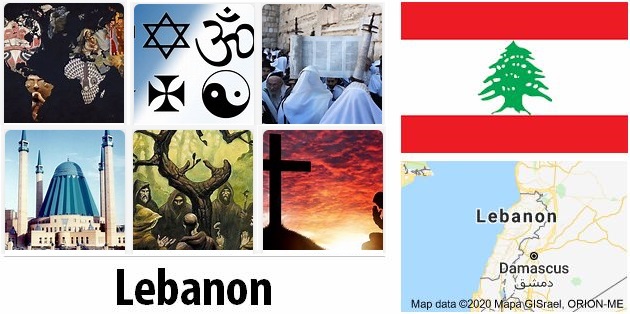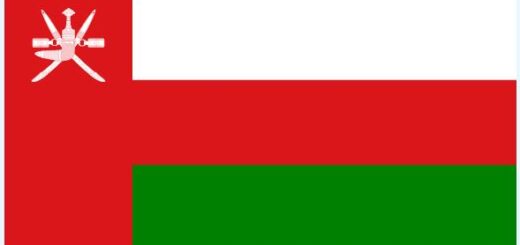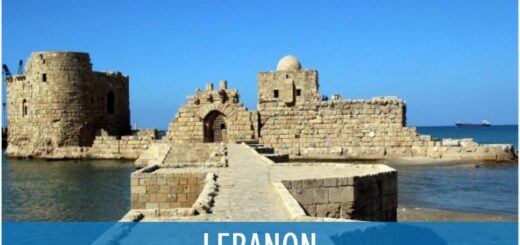Lebanon Religion
Religion in Lebanon is about much more than the practice of faith. Religious affiliation is the basis for a division of society where each group has its own political culture, affiliation and leaders. It governs the laws governing privacy, such as engagement, marriage, divorce, inheritance and adoption.
There is no state religion, however, there are 18 recognized religious population groups. The two major religions are Christianity and Islam.
Beliefs and religious values are important to most Lebanese. Between 96 and 98 percent believed in God in a study conducted a few years ago by a Swedish-Lebanese research group.
Both Sunni and Shia Muslims constitute large parts of Lebanon’s population. The division of Islam into the two main groups is based on a dispute over who was entitled to succeed Prophet Muhammad when he died in 632. Sunni is the dominant direction within Islam. Shi’a Muslims believe that leadership in religion must be based on kinship with the Prophet, while Sunni Muslims believe that believers can choose their supreme leader according to skill.
Lebanese scripted Shi’ite Muslims have often been trained in Iran or Iraq. Until his death in 2010, storayatolla Muhammad Husain Fadlallah was the spiritual leader of the Lebanese Shia Muslims and his death triggered major grief events in Lebanon. Fadlallah was born and educated in Najaf, Iraq. His name was often associated with the Hezbollah movement, although over the years he became more moderate and distanced himself from Hezbollah’s close ties with Iran. Fadlallah considered the major Ayatollah Ali Sistani in Iraq as his prime role model.
The druses are a sect with Shi’a Muslim character. They are descended from disciples of the Egyptian caliph al-Hakim (986–1021), who considered themselves the incarnation of God on earth. The Drusians believe that al-Hakim will one day return. They are very secretive about their faith and often adapt to other religions in the area where they live.
The Alawites are another Shi’a Muslim group that has been based on the belief that the Prophet’s family has a key role in history; The name comes from Ali, who was married to Muhammad’s daughter Fatima and was one of Islam’s early leaders after the Prophet. Conservative Sunni Muslims still do not see Alawites as believers. In the light of religious persecution, the Alawites are one of the approaches that have applied taqiyya, to protect themselves by hiding their true religion. For example, when Alawites celebrate Christmas and Easter, it can be difficult to know how much the traditions have actually been influenced by Christianity.
- Countryaah: Population statistics for 2020 and next 30 years in Lebanon, covering demographics, population graphs, and official data for growth rates, population density, and death rates.
Another Shiite group is the Ismailites. Throughout history, they have also emphasized keeping their faith secret in order to avoid reprisals from stronger groups.
The largest Christian group is the Maronites. In 1182 they established ties with the Pope in Rome, which were subsequently broken to be restored again in the 16th century. The Maronite Church is a native church that, too, has retained its distinctive character through the rather isolated lives of its followers in the mountains of Lebanon. Arabic and Aramaic are used in the rituals. The focus is believed to have arisen around a Christian ascetic in the 400s named Maron.
The second largest Christian group belongs to the Greek Orthodox Church. Central to the Orthodox Church is contemplation and inner stillness. Unlike the Catholics, the role of the Orthodox pope does not recognize, but every church is led by a patriarch.
In the early 18th century, a group of Greek Orthodox Lebanese jumped off and joined the Catholic Church in Rome. The Greek-Catholic group constitutes the third largest Christian group in Lebanon and has largely preserved ancient Orthodox rituals.
There are also small groups belonging to the Roman Catholic Church, the Armenian Orthodox Church, the Syrian Orthodox Church (Jacobites) and the Assyrian (Nestorian) Church. There are also a few Protestants, especially Presbyterians and Anglicans.
Lebanon’s small Jewish group has long been an integral part of society. However, when the State of Israel was proclaimed in 1948, it became increasingly associated with the Jewish state’s politics. The growing conflict between Israel and the Arab countries increased the hostility towards the Jews and many emigrated.
Sources for this chapter: Europa World Plus, Internationales Handbook – Münzinger Archive, International Religious Freedom Report for 2013, Lebanon: A country study and more
About our sources
2013
December
Islamist movement targets Lebanon
The Sunni Muslim Islamist al-Nusra Front, which has ties to the al-Qaeda terror network and is fighting the Syrian government, announces that it has now extended its fight to Lebanon. The al-Nusra front classifies Hezbollah as a legitimate target for attacks as the movement runs counter to the Syrian government’s side against the rebels.
Syrian helicopters are fired
Lebanese air defense attacks Syrian helicopters bombing rebel targets on the Lebanese side of the border. Since the start of the Syrian war, Syrian flights have repeatedly attacked targets on Lebanese territory. This is the first time the army has been using military means to counter a Syrian attack.
New Shells
At the end of the month, new fire breaks out across the border with Israel but no one is injured.
Famous Syrian critic killed in car bomb
A few days before the New Year, a car bomb is blown into the center of Beirut, killing a former adviser to the March 14 alliance and a well-known critic of the Syrian regime. Another six people lose their lives in the attack. The March 14 alliance accuses Syria and Hezbollah of being behind the deed.
Bombing in eastern Lebanon
A number of people are injured when a car bomb is detonated at a roadblock set up by Hezbollah in eastern Lebanon.
Elders battle with Israel
Tensions arise at the border with Israel in the middle of the month as Lebanese forces kill an Israeli soldier. Israel answers the fire.
November
Bomb attack against Iran’s embassy
At a bomb attack on Iran’s embassy in Beirut, at least 23 people are killed, including Iran’s cultural attaché. The deed is believed to be linked to Hezbollah interference on the part of the regime in the Syrian civil war. Iran is one of Hezbollah’s foremost backers and the embassy is located in a Hezbollah- dominated area in Beirut that has been subject to several recent attacks. One of Hezbollah’s top leaders also killed the attack.
Sun conductor seized
Hashem Minkara, who heads the Islamic Action Front, an umbrella organization for Sunni Muslim pro-Syrian groups, is arrested by police. He is suspected of being behind the double blast in Tripoli in August.
Religious leader killed in ongoing fighting
At least fourteen people lose their lives and far more are injured in continued fighting in Tripoli. In a single incident, a religious leader who supported the Syrian regime is murdered.
October
New battles in Tripoli
At the end of the month, new fighting in Tripoli is flaring up between Alawites and Sunni Muslims.
Additional missiles are fired
Lebanon is blaming Syrian air for attacking targets in the mountainous region of Arsal where there are many secret avenues for smuggling weapons and rebels to and from Syria. Later in the month, four missiles fired at one of the Hezbollah militia mounts in the Bekaa Valley. No people are injured in the attacks.
September
Hezbollah and Sunni Muslims clash
Five people are killed in an armed clash between Hezbollah and Sunni Muslims in the city of Baalbek in eastern Lebanon.
August
Israeli Flight Attacks
Israeli Air Force shoots a stronghold for a Palestinian guerrilla group south of Beirut. The attack takes place since four missiles were fired at Israel from Lebanon.
Sanctions against Hezbollah leaders
US imposes sanctions on four Hezbollah leaders as punishment for supporting the regime in Syria as well as funding terrorist operations in other parts of the Middle East.
Additional bomb attacks require many casualties
At least 27 people are killed and over 330 injured by a new car bomb in Beirut. The bomb is triggered near one of Hezbollah’s strongholds in a neighborhood dominated by Shiite Muslims and another large bomb exploded in July. A hitherto unknown group of Aisha battalions take on the blame for the deed, saying it is a revenge for Hezbollah’s involvement on the regime side in the civil war in Syria (where the rebel side is dominated by Sunni Muslims). The group states that it was also behind the bomb in July. Hezbollah’s leaders assure after the incident that the violence will not prevent Hezbollah from stepping up its efforts in Syria.
A week later, two car bombs explode outside Sunni Muslim mosques in Tripoli, whose leader has criticized the Syrian regime. At least 45 people are killed. It is the bloodiest assault since the 1975-1990 civil war. No group is to blame.
July
Hezbollah terrorist stamped
The European Union, the EU, classifies Hezbollah’s military branch as a terrorist organization. This means that Hezbollah’s sympathizers in Europe can no longer send money to the armed branch of the movement and that its assets in Europe can be frozen.
Terrorist attack in Beirut
At least 53 people are injured by a powerful car bomb that explodes in a part of Beirut controlled by Hezbollah. The attack is the worst of its kind in Lebanon in several years. A little-known Syrian group, the Special Forces 313rd Brigade, says it performed the deed.
June
Many dead in clash in Saida
Violent confrontations are taking place between Shia and Sunni Muslims in the city of Saida, and the army is deployed to restore peace. At least 16 soldiers are killed when supporters of a hard-line Sunni Muslim leader storm a roadblock to free a cousin who has been seized by government forces. In continuing battles, according to Army 20, the followers of the religious leader are killed. The group’s headquarters are occupied by the soldiers but the leader is not found.
May
Selections are pushed forward
In view of the turmoil in the country, Parliament decides to suspend the general elections that will take place in June and instead hold elections in November 2014.
Attack on Hezbollah controlled area
Three people are injured in a missile attack on an area in southern Beirut controlled by Hízbollah. It is not immediately clear who fired the missiles.
New battles
More than 30 people are killed in new fighting between Sunni Muslims and Alawites in the city of Tripoli (see February 2012).
April
Hezbollah recognizes war intervention
Hezbollah’s leaders publicly state that the movement has entered the Syrian civil war on the government’s side. It already happened at the end of 2012.
A new head of government is appointed
A 68-year-old former minister of culture, Tamam Salam, is elected by a large majority of parliament as new head of government. Salam is the son of one of the country’s legendary politicians, Saeb Salam, who was prime minister in six rounds. Salam is close to the Sunni-dominated Future Movement, which is a leading force within the March 14 alliance, but his candidacy is also supported on the March 8 movement and thus by Shiite Hezbollah.
March
Syrian attacks on Lebanon
Syrian air strikes targets in Lebanon for the first time. The attack is directed at the area around the city of Arsal in the east. The city’s population is dominated by Sunni Muslims, many of whom support the rebels inside Syria. The border between Syria and Lebanon is porous and some Syrian rebels are hiding from sympathizers in Arsal.
Prime Minister resigns
Prime Minister Mikati submits his and the government’s resignation application. This happens after the ministers failed to approve a commission to oversee this summer’s planned parliamentary elections. Another unresolved dispute was an extension of the mandate of the country’s internal security chief, Ashraf Rifi. Mikati wants Rifi to remain in his post, which Hezbollah opposes.
January
Billion programs should promote growth
The Bank of Lebanon is launching a billion-dollar program to promote growth in the country that has slowed down due to the civil war in Syria. The Lebanese are offered loans on favorable terms for, among other things, buying houses, starting businesses and saving energy.




